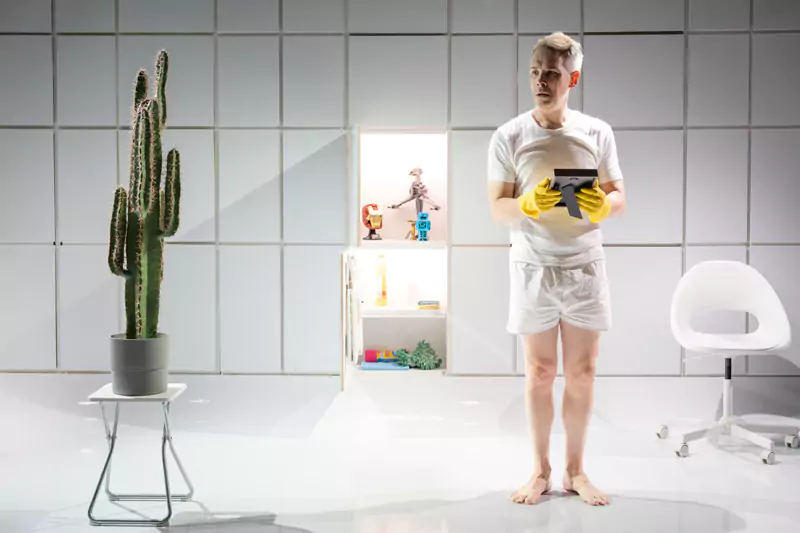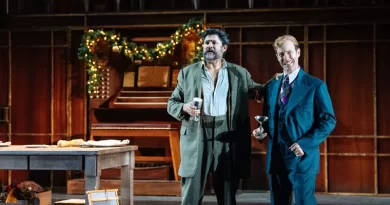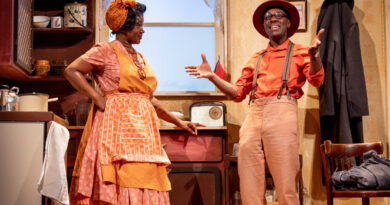“Clive” at the Arcola Theatre drama review
Tom Bolton in East London
3 August 2025
The interior of Thomas’s flat consists of white, wipe-clean surfaces, and functional gadgets – coffee machine, laptop, Alexa. The only thing that doesn’t fit is a tall, spiky cactus called Clive. In Michael Wynne’s new 65-minute, one-man play Thomas (Paul Keating) lives alone, watching the world outside his flat on his screen and through the window, with its view across a canal into the imagined lives of others in the building opposite.

Paul Keating as Thomas.
Photo credit: Ikin Yum.
At first he seems a little fussy but in control of his life, an impression that disintegrates over the course of an hour as his obsession with cleanliness grows, his isolation increases, and rejection mounts as it becomes clear that real connection is beyond him. Even the cactus has the capacity to hurt him.
The show, imaginatively directed by Lucy Bailey, makes great use of the Arcola’s studio theatre. Mike Britton’s wall of cupboards brings bursts of colour into the space as doors are opened, and Chris Davey’s lighting transforms the flat into “Mexico”, “Iceland”, or whatever Thomas asks Alexa.
Keating – who worked so successfully with Bailey at the Arcola in 2016 when he starred in Mike Poulton’s play Kenny Morgan, telling the story of Terence Rattigan’s real-life inspiration for The Deep Blue Sea – is excellent. He holds the audience’s attention effortlessly and draws them into his increasingly dysfunctional world. He moves from gleeful dancing, polishing the floor with mops attached to his feet, to a full-blown crisis over the course of a well-balanced performance. His victimization as a gay man drives the psychological difficulties that begin to engulf him, retreating from a world that does not seem to want him.
However, the script by Wynne – who won an Olivier Award for Best New Comedy for his 2009 play The Priory – falls somewhat short. The tone is uneven, with the titular cactus bringing a more whacky than gothic tone to the story, which seems at odds with the abusive and self-destructive behaviour surrounding Thomas. There is also too much telling, as Thomas explains what he is doing and why, narrating his own actions while telling us little we do not already know. Thomas also seems naïve about people in a way that does not fully convince us he is a fully realized character.
The play was inspired by Philip Ridley’s Covid-era dramatic monologue The Poltergeist, but Clive lacks the weirdness and unremitting menace that make Ridley’s work so compelling. Clive is a well-performed and produced show, but the writing is too predictable for it to be more than the sum of its parts.









